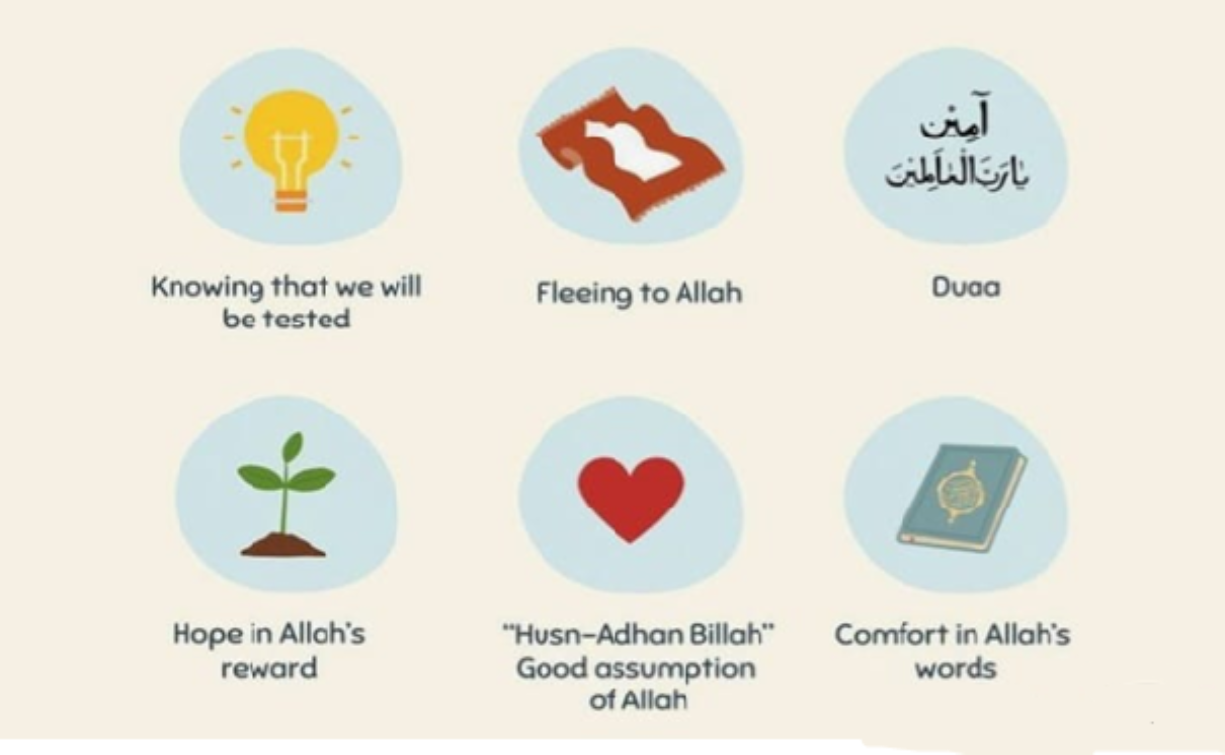Life’s challenges can feel overwhelming, but Islam offers profound guidance on enduring hardships. The life of the Prophet Muhammad (peace be upon him) serves as a beacon of hope, demonstrating how faith, paired with a psychologically sound mindset, can help us navigate even the toughest trials. By examining the Prophet’s responses to difficulties, we can uncover a harmonious blend of spiritual wisdom and psychological resilience.
Knowing That We Will Be Tested
The Quran emphasizes that tests are a natural part of life: “Do people think that they will be left alone because they say: ‘We believe,’ and will not be tested?” (Al Ankabut: 2). From a psychological perspective, accepting that hardships are inevitable is a crucial step toward resilience. Research shows that when we acknowledge difficulties as part of life, we are better equipped to handle them. This mindset, known as “cognitive acceptance”, reduces the emotional shock when challenges arise.
The Prophet Muhammad (peace be upon him) embodied this acceptance. Despite losing his parents, enduring persecution, and facing personal losses, he maintained a steady faith, understanding that these trials were opportunities for growth. As he said, “The people who are tested the most are the prophets, then the next best, and then the next best…” (Sunan Ibn Majah 4023). By knowing we will be tested, we can prepare mentally and spiritually, reducing the impact of adversity on our well-being.
Fleeing to Allah
When confronted with difficulties, the Prophet (peace be upon him) instinctively turned to Allah. This act of fleeing to Allah is deeply connected to the psychological concept of seeking a secure base—a strategy where individuals turn to a trusted source for comfort and support during times of stress. For the Prophet, this secure base was his faith in Allah.
Research in psychology highlights the importance of having a secure base, whether it’s a person, a belief, or a place, to help regulate emotions and provide a sense of safety. The Prophet’s reliance on Allah provided him with an unshakable sense of security, allowing him to face life’s challenges with calm and clarity. His duaa during distress, “O Allah, I hope for Your mercy. Do not leave me in charge of my affairs even for the blink of an eye…” (Sunan Abi Dawud 5090), reflects this deep trust in Allah as his ultimate refuge.
The Power of Duaa
Duaa (supplication) is not just a religious practice but also a powerful psychological tool. The act of verbalizing one’s worries and desires helps in processing emotions, a concept known in psychology as “emotional expression.” When we make duaa, we are not only seeking Allah’s help but also giving voice to our inner struggles, which can be incredibly therapeutic.
The Prophet (peace be upon him) taught that making duaa, even in the darkest times, was essential. He said, “Indeed, your Lord is generous and shy. If His servant raises his hands to Him (in supplication), He becomes shy to return them empty” (Sunan Abi Dawud 1488). This practice fosters emotional regulation by allowing us to release our anxieties, leading to greater emotional stability.
Hope in Allah’s Reward
Optimism is a well-documented psychological trait that enhances resilience. The Prophet Muhammad (peace be upon him) consistently emphasized the rewards of patience, nurturing a hopeful mindset. He assured believers that enduring hardship with patience would lead to immense rewards, both in this life and the hereafter.
Studies show that having hope and focusing on positive outcomes helps individuals cope better with stress and reduces feelings of helplessness. The Prophet’s reminder, “No fatigue, nor disease, nor sorrow, nor sadness… but that Allah expiates some of his sins for that” (Sahih al-Bukhari 5641), encourages us to focus on the spiritual benefits of our struggles, thereby cultivating an optimistic outlook that fuels perseverance.
Good Assumption of Allah
Maintaining a good assumption of Allah aligns with the psychological principle of “positive reappraisal,” where individuals reinterpret a challenging situation in a more positive light. In a Hadith Qudsi, Allah says, “I am as My servant thinks of Me” (Sahih al-Bukhari 7405). This means that if we expect good from Allah, we will find it. The Prophet (peace be upon him) exemplified this mindset, encouraging us to always maintain a positive outlook and trust in Allah’s plan. He believed that whatever Allah decreed was ultimately for his benefit, which helped him remain calm and content.
Positive reappraisal has been shown to reduce stress and increase well-being. By adopting the Prophet’s mindset, we can approach our challenges with a positive outlook, believing that there is always wisdom and goodness in Allah’s plan.
Comfort in Allah’s Words: Finding Cognitive Reassurance
The Quran served as the Prophet’s source of cognitive reassurance. In psychology, “cognitive restructuring” refers to changing negative thought patterns to reduce stress and improve emotional well-being. The Quranic verses that reassured the Prophet (peace be upon him), such as “So verily, with the hardship, there is relief” (As Sharh:6), are examples of how positive affirmations can help reframe our thoughts, making us more resilient in the face of adversity.
The Prophet Muhammad’s (peace be upon him) approach to hardship offers a profound blend of faith and psychological wisdom. By knowing that we will be tested, seeking refuge in Allah, making duaa, maintaining hope in Allah’s reward, nurturing good assumptions of Allah, and finding comfort in His words, we can develop the resilience needed to face life’s challenges. These strategies not only strengthen our faith but also align with psychological principles that promote mental well-being, showing us that true resilience comes from a heart anchored in faith and a mind nurtured by wisdom.





